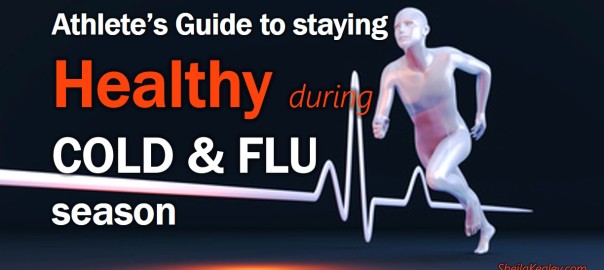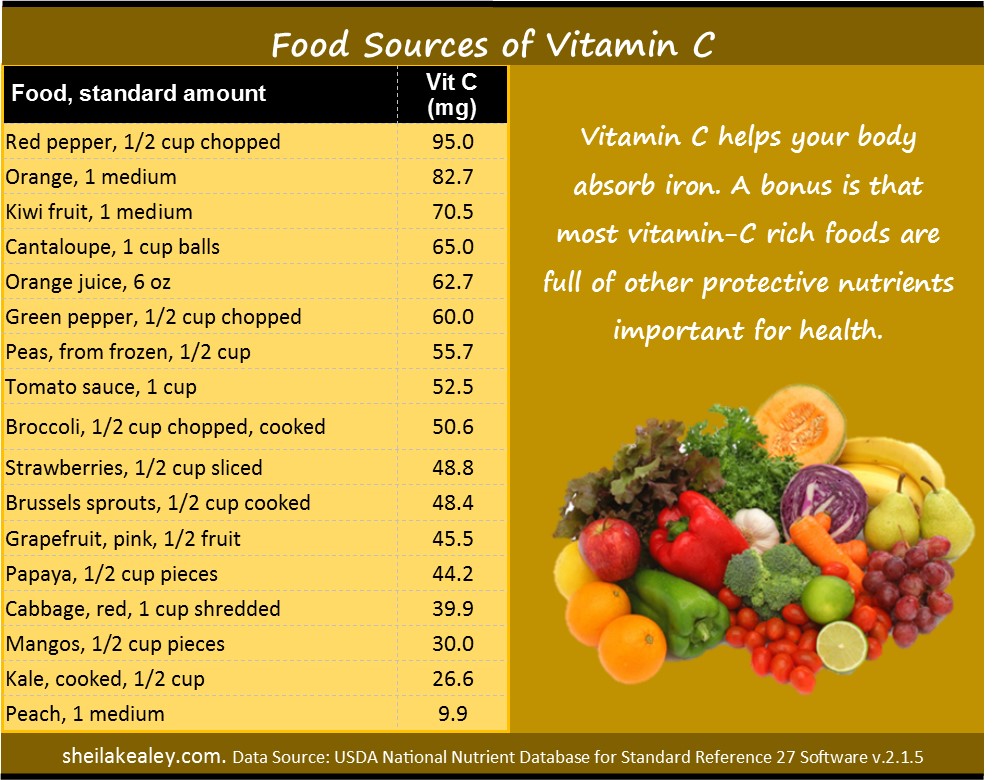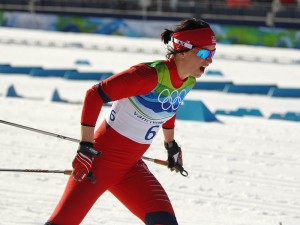
The Norwegian team fought off more than their competitors at the Vancouver Olympics: following guidelines developed by their medical team after disappointing results at the Turin Olympics, they managed to fight off viruses at an impressive rate: only 5% of athletes got sick (compared to 17% in Turin) and just 4 missed an event because of illness (compared to 8 in Turin).
Illness can have far reaching effects among athletes if it strikes during an important competition or compromises training. A mild infection like a cold that wouldn’t cause absenteeism in the general public can influence an athlete’s training and performance. Also, circumstances like travel to races and close contact with teammates can predispose athletes to illness. Upper respiratory tract infections (colds, coughs, flu, sinusitis, throat and ear infections) are some of the most common illnesses reported.
Although generally physical activity strengthens the immune system, high performance athletes may be more susceptible to infection at certain times, especially after intense or prolonged training sessions or during a heavy training load. After hard training, researchers have observed a decreased immune function in athletes, meaning that conditions are ripe for viral illnesses to take hold: these changes include increased cortisol levels, and increases in substances that could negatively impact white blood cell function (white blood cells help protect your body from infectious diseases).
Strengthen Your Immune System
But all sickness isn’t inevitable. Your first and best defense should be to maintain a strong immune system that is primed to fight off the germs, viruses, and other invaders that most of us are constantly exposed to.
Your immune system is not one entity, but an amazing interconnected network that includes cells, organs, and molecules that work together to protect you from colds, flu, and other ailments. The system is so complex that many factors can influence how it performs, including things that you can control, like your training, lifestyle habits, and nutrition.
Do you want your immune system to perform at its best? Here are some tips.
Get Enough Sleep
 Sleep gives your body a chance to restore and repair itself. Sleep is also critical to many aspects of your mental, physical, and emotional health. Unfortunately, many athletes sacrifice the sleep they desperately need to squeeze more into each day.
Sleep gives your body a chance to restore and repair itself. Sleep is also critical to many aspects of your mental, physical, and emotional health. Unfortunately, many athletes sacrifice the sleep they desperately need to squeeze more into each day.
Lack of sleep makes it harder for your immune system to do its job: during sleep, your body produces infection-fighting antibodies and protective “cytokines,” proteins that orchestrate your body’s response to infection and inflammation. Studies suggest that lack of sleep affects the ability to process carbohydrates, manage stress, fight infection, and regulate hormones (and importantly for athletes – it also hinders coordination, reflexes, and the ability to learn a new skill). Sleep deprivation can also reduce the effectiveness of flu vaccines.
People who don’t get enough sleep are more susceptible to getting sick after exposure to a virus. In fact, a recent study found that too little sleep can quadruple your risk for colds. Researchers exposed individuals to a cold virus, and found that those who slept less than 6 hours a night were 4.5 times more likely to catch a cold than those who slept more than 7 hours a night. The influence of sleep on colds was far greater than all other factors measured (which included age, stress, race, education, income). Don’t assume that 7 hours is an optimal amount of sleep based on this study (which looked at non-athletes); athletes generally need more sleep than the general population.
If you want to keep colds, flu, and bacterial infections at bay, prioritize sleep!
Practice Good Sports Nutrition
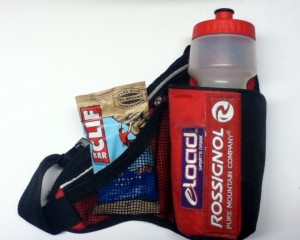 Many athletes neglect the importance of sports nutrition. This takes planning and a bit of time, but is definitely worth the effort. What you eat before workouts, during workouts, and after workouts not only supports your athletic endeavors, but can keep your immune system strong. One area that I see many athletes neglecting is consuming carbohydrates during long or intense training sessions, or coming to training sessions underfueled.
Many athletes neglect the importance of sports nutrition. This takes planning and a bit of time, but is definitely worth the effort. What you eat before workouts, during workouts, and after workouts not only supports your athletic endeavors, but can keep your immune system strong. One area that I see many athletes neglecting is consuming carbohydrates during long or intense training sessions, or coming to training sessions underfueled.
Athletes who don’t consume sufficient carbohydrates during intense or long training sessions might be decreasing their ability to fight off infections. Carbohydrates help maintain blood glucose concentration and limit metabolic stress: this study found that carbohydrate consumption during exercise was associated with lower stress hormones (cortisol and adrenaline) and reduced symptoms of overreaching, and another study found that exercising in a glycogen (stored carbohydrate) depleted state negatively influenced stress hormones. This article updates the latest recommendations for carbohydrate intake during exercise.
Eat a Healthy Diet
 Athletes should consume a nutrient-rich diet with adequate calories to support their activities and the vitamins and minerals necessary for good health. A dietary pattern that has been found to prevent chronic disease is also your best bet to fight off infectious diseases. Focus on vegetables and fruits, legumes, whole grains, lean proteins, and healthy fats while limiting processed foods, refined grains, and sugars.
Athletes should consume a nutrient-rich diet with adequate calories to support their activities and the vitamins and minerals necessary for good health. A dietary pattern that has been found to prevent chronic disease is also your best bet to fight off infectious diseases. Focus on vegetables and fruits, legumes, whole grains, lean proteins, and healthy fats while limiting processed foods, refined grains, and sugars.
Sugar intake can be confusing for athletes, because during workouts sugar is often your body’s fuel of choice for optimal performance. The trick is to save these sweet foods for when you need them during intense or long bouts of activity and when your body processes them to help you move, and limit them at other times.
What About Supplements?
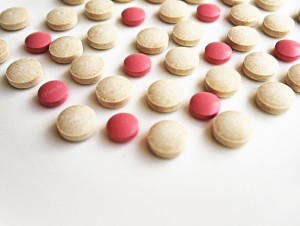 In general, there is no convincing evidence to suggest that supplements boost immunity or prevent colds in healthy individuals, although they may help malnourished or some individuals deficient in critical nutrients.
In general, there is no convincing evidence to suggest that supplements boost immunity or prevent colds in healthy individuals, although they may help malnourished or some individuals deficient in critical nutrients.
Here is the the latest research on popular cold and flu supplements . . .
Vitamin C. Despite being disproven by countless studies, many people believe high doses of Vitamin C will help prevent the common cold. Some inconsistent evidence suggests that low-dose (250 mg – 1000 mg/day) supplementation with vitamin C might reduce the duration of a cold, and 5 studies in people exposed to severe physical exercise (including marathon runners and skiers) suggest that vitamin C might cut the risk of getting a cold in half (though 2 studies in competitive swimmers and marine recruits showed no effect).
Zinc. High doses of zinc acetate may reduce the duration of a cold, according to a recent analysis of three clinical trials. But zinc has potential side effects so don’t take for over a week, or as a cold-preventative.
Cold-FX boasts many questionable claims, and there’s no evidence of benefit at symptom onset (and very weak evidence as a cold preventative).
“Immune boosting supplements” are a waste of money. And you may see lists of “immune-boosting” foods, but your best bet is to consume a healthy diet that includes a variety of fruits and vegetables. In case you’re compelled to take Vitamin C based on the research noted above, here’s a list of foods rich in vitamin C (and many other protective compounds).
It’s important to consider research showing that megadoses of certain vitamins can actually suppress the immune system; for example, zinc is important for immune function, but high dose supplements may actually suppress immune response.
Also, athletes should keep in mind the emerging evidence showing that antioxidant supplements might actually hurt performance by reducing the health-promoting effects of training.
Maintain a Healthy Weight
 Fat cells influence the immune system. While most people consider fat inert, scientists now view it as an endocrine or immune organ that secretes hormones and other substances that influence many of the body’s processes. Excess body fat promotes the production of inflammatory immune cells that predispose to illness and disease and a weaken the immune system’s response to infections. So if you are overweight losing weight can improve immune function.
Fat cells influence the immune system. While most people consider fat inert, scientists now view it as an endocrine or immune organ that secretes hormones and other substances that influence many of the body’s processes. Excess body fat promotes the production of inflammatory immune cells that predispose to illness and disease and a weaken the immune system’s response to infections. So if you are overweight losing weight can improve immune function.
But inadequate body fat stores are problematic as well, and this could be a problem for athletes focused on becoming too lean. Some fat is essential for a healthy body and immune system, and too little body fat can promote illness, increase susceptibility to colds and other viruses, and lead to immune system abnormalities. Also, athletes should avoid rapid weight loss or severe calorie restriction as it compromises performance, health, and increases susceptibility to infections.
Respect Rest and Recovery Days
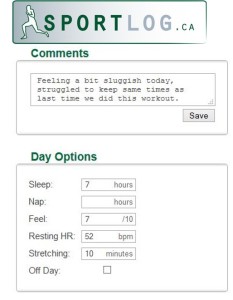 Intense training is necessary to improve, but without adequate recovery built into a training program intense or excessive training can lead to a compromised immune system and decreased performance. Athletes react differently to training loads, so adjust your training or talk to your coach if you’re feeling unusually tired.
Intense training is necessary to improve, but without adequate recovery built into a training program intense or excessive training can lead to a compromised immune system and decreased performance. Athletes react differently to training loads, so adjust your training or talk to your coach if you’re feeling unusually tired.
It’s a good idea to keep a detailed training log where, in addition to noting workout specifics, you can keep track of your sleep and fatigue levels. While some fatigue is expected after hard weeks or hard workouts, prolonged or unusual periods of fatigue are a sign that you need some time off.
Get the Flu Shot
Even healthy people can get pretty sick from influenza and spread it to others. Some experts believe athletes might be at higher risk of becoming infected if they have a high training load that compromises their immunity. And if infected with the flu, athletes may be at higher risk for complications like myocarditis.
A seasonal flu shot will help you develop antibodies against the viruses contained in the vaccine, greatly reducing your chance of getting infected with the flu. If you do get infected, it will reduce the severity of the illness. Importantly, protecting yourself from flu will also help protect those around you who may be more vulnerable if they become infected (i.e., older people, those with compromised immune systems).
Time it Right. Elite athletes may have concerns about the timing of the flu shot and other vaccinations. This recent article outlines vaccination guidelines for elite athletes. It is a great resource and discusses vaccines recommended for athletes, and optimal timing to minimize interference with training and racing, and other issues specific to athletes.
Learn How to Respond to Stress
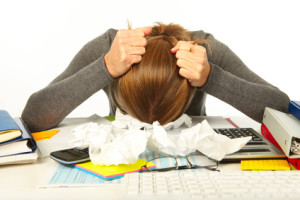 Beyond the stress of intense exercise sessions, athletes may have stress related to school work/exams, job responsibilities, family obligations, and social interactions.
Beyond the stress of intense exercise sessions, athletes may have stress related to school work/exams, job responsibilities, family obligations, and social interactions.
High academic stress can increase illness and injuries in athletes. Athletes are more than three times more likely to get injured during times of high academic stress compared to periods of low academic stress, according to a recent study by researchers at the University of Missouri.
Strategies to help cope with stress. Avoiding stressful situations isn’t always possible or practical. In fact, it’s likely how we respond to stress and not the stressor itself that contributes to illness. One study found that collegiate athletes (rowers) assigned to a group that learned strategies to cope with stress (Cognitive Behavioral Stress Management – CBSM) experienced significant reductions in the number of illness and injury days and reported half the number of health services visits compared to athletes who didn’t learn these strategies. (You can learn more about CBSM strategies in this lecture).
Mindfulness training is an additional strategy that is gaining popularity among athletes. A study of elite junior athletes in Norway found that 12 weeks of mindfulness training had a positive impact on the athletes’ recovery and prevention of burnout, and a study in BMX riders found that a 7-week mindfulness training course improved several measures of self-awareness and stress response.
It might be helpful to keep in mind that stress isn’t necessarily a bad thing. As athletes, stress allows us to get stronger, fitter, and faster: hard workouts stress our body’s systems and they respond by adapting to handle the stress. Mental stresses allow us to figure things out, become more resilient, and learn to adapt to difficult situations.
That said, sometimes life throws you more stressors than you are primed to deal with. Try to anticipate periods of added stress (e.g., exam period) and adjust your workouts accordingly.
Don’t worry too much . . . Worrying is a form of stress and can affect health — and that includes worrying too much about getting sick! At least you can put the fears of sickness caused by airplane air, germs in gyms, and necessity of wearing face masks aside, according to UC Berkeley Wellness.
Limit the Invaders
While a strong immune system will improve your odds of staying healthy, you can also reduce your risk of infection by limiting your exposure to cold and flu causing germs.
Handwashing
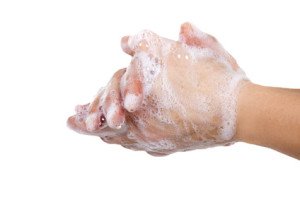 Handwashing is an effective way to reduce the risk of infections. Many viruses are easily spread by direct contact, and unwashed hands are a terrific vehicle for germs. Your eyes, nose, and mouth are the route that most cold and flu viruses enter your body, and most people touch these areas many times throughout the day, often without realizing it.
Handwashing is an effective way to reduce the risk of infections. Many viruses are easily spread by direct contact, and unwashed hands are a terrific vehicle for germs. Your eyes, nose, and mouth are the route that most cold and flu viruses enter your body, and most people touch these areas many times throughout the day, often without realizing it.
So keep those hands away from your face, and wash them, especially after being in contact with someone who has a cold and other obvious times (e.g., preparing food, after using the toilet, playing with pets, etc.).
Most people could use a refresher in handwashing: a recent study found that only 5% of people wash hands the right way.
Here’s how to do it right:
- Wash all surfaces of your hands with plain soap and hot water for about 20 seconds (about the time it takes to sing Happy Birthday twice – or if you prefer One Republic check out the video below!). Handwashing reduces the risk of getting sick by creating a slippery environment that causes microorganisms to slip off the hands.
- Use a hand sanitizer (alcohol gels and wipes with at least 60% alcohol) when you don’t have access to soap and water. (Generally handwashing is preferable and just as effective at reducing the spread of germs).
- Skip antibacterial soaps and antiseptic products. Research shows they have no benefit over regular soap and water, can cause skin irritation, and promote drug-resistant bacteria.
Limit exposure
Keep your distance and limit your exposure to infected people, and be sure to wash your hands after coming into contact. If facilities are available, coaches might consider giving a sick athlete their own sleeping quarters.
I Got Sick! Now What?
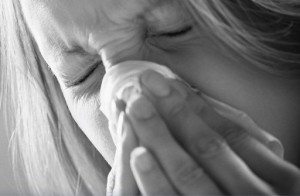 Try not to expose others. Limit contact with others, and cover your mouth and nose with a tissue when you cough or sneeze to prevent the spread of germs. If you don’t have a tissue cough or sneeze into your upper sleeve or elbow, not your hands.
Try not to expose others. Limit contact with others, and cover your mouth and nose with a tissue when you cough or sneeze to prevent the spread of germs. If you don’t have a tissue cough or sneeze into your upper sleeve or elbow, not your hands.- Get plenty of sleep and stay hydrated. Warm liquids may feel soothing to a sore throat, ease congestion, and increase the flow of mucus.
- Over the counter products won’t cure your cold but can help ease symptoms. Keep in mind that they aren’t without side effects: some can cause drowsiness or disrupt sleep. Also, some contain a stimulant (pseudoephedrine) that is banned during competition (WADA advises athletes to avoid pseudoephedrine-containing cold and flu products for several days in advance of competition).
- Supplements. Although marketing efforts will lead you to think otherwise, the evidence that supplements, pharmaceuticals, or products will shorten the duration of your cold is nonexistent or weak. Some evidence suggests that zinc lozenges taken at the first symptoms may help a cold (be sure not to take them for more than a week, or long-term in the hopes you’ll prevent a cold). Cold-FX is a popular remedy boasting questionable claims, but there’s no evidence of benefit at symptom onset (and very weak evidence as a cold preventative). Sorry if I’ve ruined any placebo effect these supplements might have!
- If you suspect you have the flu see your doctor. Ask about antiviral drugs that can shorten the duration of the flu and possibly reduce its intensity.
- Home Remedies. Gargling with salt water might ease cold symptoms, and this study suggested that regularly gargling with salt water decreased colds by 40%.
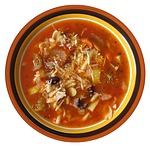 Chicken soup for a cold? A handful of studies have looked into this folk remedy, but the benefits aren’t clear. In 1978, Mount Sinai researchers conducted a study and found that a classic chicken soup was more effective at fighting congestion than hot or cold water. A more recent study found that a traditional “Grandma’s” chicken soup with onions, sweet potatoes, parsnips, turnips, carrots, celery, parsley, might ease cold symptoms, possibly due to mild anti-inflammatory effect (although researchers could not isolate which soup ingredients were protective). Generally the evidence for chicken soup helping colds is weak, but it seems that any nourishing hot soup might have some benefits, due to their nutrition-filled broth that rehydrates, easy feeding for a sore throat or poor appetite, or hot vapors to help clear nasal passages.
Chicken soup for a cold? A handful of studies have looked into this folk remedy, but the benefits aren’t clear. In 1978, Mount Sinai researchers conducted a study and found that a classic chicken soup was more effective at fighting congestion than hot or cold water. A more recent study found that a traditional “Grandma’s” chicken soup with onions, sweet potatoes, parsnips, turnips, carrots, celery, parsley, might ease cold symptoms, possibly due to mild anti-inflammatory effect (although researchers could not isolate which soup ingredients were protective). Generally the evidence for chicken soup helping colds is weak, but it seems that any nourishing hot soup might have some benefits, due to their nutrition-filled broth that rehydrates, easy feeding for a sore throat or poor appetite, or hot vapors to help clear nasal passages.
Should You Exercise When You’re Sick?
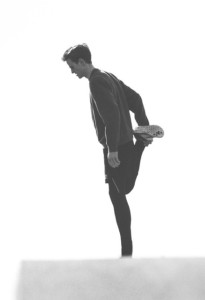 Low intensity exercise can sometimes be helpful, but high intensity workouts or long training sessions aren’t a good idea; let the severity of your symptoms and how you feel guide you.
Low intensity exercise can sometimes be helpful, but high intensity workouts or long training sessions aren’t a good idea; let the severity of your symptoms and how you feel guide you.
Some exercise physiologists encourage low to moderate exercise, especially for head colds where symptoms are above the neck (runny noses and sneezing), but advise more caution for colds that produce fevers or chest congestion.
Although this hasn’t been studied extensively, research has found that exercising with a cold didn’t affect lung function or exercise capacity, cold symptoms, or recovery time, and this study (in mice) found that moderate exercise lessened flu symptoms in mice infected with the virus.
You might consider illness a good time to focus on other sports-related activities (stretching, recovery techniques, mental training) or activities that don’t elevate heart too much or require strenuous breathing (skills and technique training).
Bottom Line
Strengthening your immune system and limiting invaders will help keep you healthy. A bonus is that beyond reducing illness, many of these strategies (getting more sleep, eating a healthy diet, reducing stress) will benefit other areas of health and athletic performance.
__________
Reviewed & updated October 24, 2016
Share This: